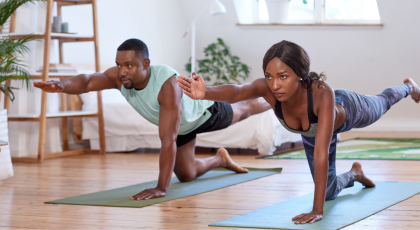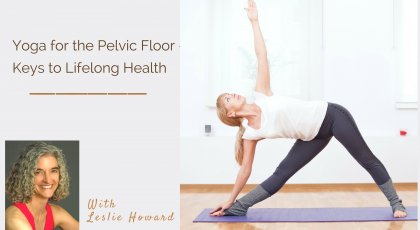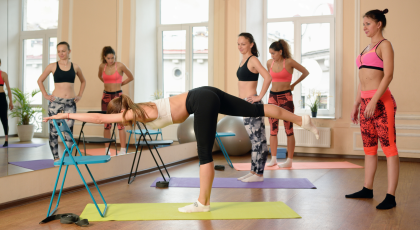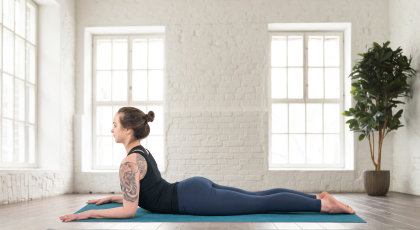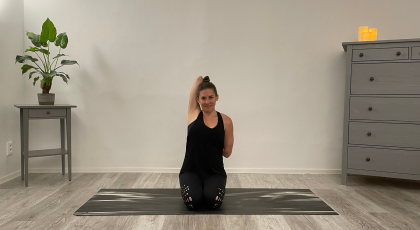View basket (0 items $0.00)

Yoga Offers More Effective Neck Pain Relief than Exercise Research Finds
Chronic neck pain and neck pain-related disability are a major public health problem. Particularly for people spending long hours working at their desk, neck pain can be a nagging, lingering issue.
Can yoga help? Indeed, several research reviews show that yoga can offer effective relief for neck pain - without painkillers and drugs.
 In a meta-analysis published in Medicine, the researchers looked at the cumulative results of 10 randomized controlled trials and found that yoga reduced neck pain intensity. The study also found a reduction in pain-related functional disability, increased cervical range of motions as well improved quality of life and a more positive mood.
In a meta-analysis published in Medicine, the researchers looked at the cumulative results of 10 randomized controlled trials and found that yoga reduced neck pain intensity. The study also found a reduction in pain-related functional disability, increased cervical range of motions as well improved quality of life and a more positive mood.
The study also compared the effects of yoga compared to regular exercise and found that several indicators improved in the yoga group but not in the exercise groups, including neck pain intensity, neck pain-related disability, mental quality of life, and lower levels of depression, and anxiety.
The study also found that yoga was superior to exercise to improve cervical range of motion with a significant difference in flexion, extension, left lateral flexion, right lateral flexion, and left rotation, however, results were limited by the fact that only 3 of the studies included measured improvements in the neck range of motion.
This finding lends further support for an earlier research review published in Clinical Rehabilitation. In this study, a team of German researchers examined all of the published randomized controlled studies in which adults with chronic neck pain were assigned to either a yoga intervention or a usual care, exercise, or non-pharmacological treatment control group. Yoga sessions included either physical movement, breath exercises, meditation, yogic lifestyle recommendations, or a combination of these skills. At the end of treatment, yoga and control group participants were compared on neck pain intensity or related neck-pain disability, as well as mood and quality of life.
A total of 3 studies including 188, predominantly female (82.4%) adults (mean age 47.5 years) were included in the analysis. On average, yoga interventions were held weekly for 9-weeks. Sessions were provided by either experienced yoga educators, or offered on audiotape.
How Does Yoga Relieve Chronic Neck Pain?
Analyses revealed that yoga provides superior results to usual care in the relief of neck pain intensity and neck pain-related disability. What’s more, yoga group participants reported better quality of life, and improved mood compared to controls. Short-term reductions in pain, disability, and negative mood were found for both movement-based, and meditation-based yoga interventions.
 There are a number of potential explanations for these results. First, movement-based yoga practices often emphasize relaxation, isometric muscle strengthening, stretching, and exploring range of motion. This may be particularly useful for those whose pain is based on chronic, stress-related muscle contraction, or for whom relaxation may be beneficial. Yoga postures may also contribute to changing dysfunctional movement patterns or altering a habitual, maladaptive posture that contributes to a person’s neck pain or muscle tension.
There are a number of potential explanations for these results. First, movement-based yoga practices often emphasize relaxation, isometric muscle strengthening, stretching, and exploring range of motion. This may be particularly useful for those whose pain is based on chronic, stress-related muscle contraction, or for whom relaxation may be beneficial. Yoga postures may also contribute to changing dysfunctional movement patterns or altering a habitual, maladaptive posture that contributes to a person’s neck pain or muscle tension.
In addition to movement, meditation-based yoga practices have the potential change person’s relationship to his or her pain. Specifically, meditation techniques focusing on attention and introspection can draw attention to negative judgements or ruminations about pain or its source that contribute to the intensity of a person’s suffering. In recognizing the role of thoughts in shaping experience, practitioners are empowered to question their significance, and transition to more adaptive beliefs.
Although we have much more to learn about the role of yoga in the treatment of chronic neck pain, the results of these reviews are cause for optimism.
Sources
Cramer H, Klose P, Brinkhaus B, Michalsen A, Dobos G (2017). Effects of yoga on chronic neck pain: A systematic review and meta-analysis. Clinical Rehabilitation. https://doi.org/10.1177/026921551769873
Yunxia, L., et al. (2019). Effects of yoga on patients with chronic nonspecific neck pain, Medicine, Feb. 98.
 B Grace Bullock, PhD, E-RYT 500 is a psychologist, research scientist, educator, yoga and mindfulness expert and author of Mindful Relationships: Seven Skills for Success - Integrating the Science of Mind, Body and Brain. Her mission is to reduce stress, increase health and well-being and improve the quality of relationships. She offers classes, workshops, writing and research that combine the wisdom of applied neuroscience, psychophysiology, psychology and contemplative science and practice. Her goal is to empower individuals, groups, leaders and organizations to reduce chronic stress and increase awareness, attention, compassion, mindfulness and effective communication to strengthen relationships, release dysfunctional patterns and unlock new and healthy ways of being. Dr. Bullock is also the Founding Director and Principal Consultant of the International Science & Education Alliance, an organization devoted to exceptional research, program evaluation, assessment design, strategic planning and capacity building to support equity, programmatic diversity and scientific integrity, and promote effective leadership, decision-making and social change. Bullock is a Certified Viniyoga Therapist and Faculty at the Integrated Health Yoga Therapy (IHYT) Training program. She is the former Senior Research Scientist at the Mind & Life Institute and former Editor-in-Chief of the International Journal of Yoga Therapy. For more information see www.bgracebullock.com.
B Grace Bullock, PhD, E-RYT 500 is a psychologist, research scientist, educator, yoga and mindfulness expert and author of Mindful Relationships: Seven Skills for Success - Integrating the Science of Mind, Body and Brain. Her mission is to reduce stress, increase health and well-being and improve the quality of relationships. She offers classes, workshops, writing and research that combine the wisdom of applied neuroscience, psychophysiology, psychology and contemplative science and practice. Her goal is to empower individuals, groups, leaders and organizations to reduce chronic stress and increase awareness, attention, compassion, mindfulness and effective communication to strengthen relationships, release dysfunctional patterns and unlock new and healthy ways of being. Dr. Bullock is also the Founding Director and Principal Consultant of the International Science & Education Alliance, an organization devoted to exceptional research, program evaluation, assessment design, strategic planning and capacity building to support equity, programmatic diversity and scientific integrity, and promote effective leadership, decision-making and social change. Bullock is a Certified Viniyoga Therapist and Faculty at the Integrated Health Yoga Therapy (IHYT) Training program. She is the former Senior Research Scientist at the Mind & Life Institute and former Editor-in-Chief of the International Journal of Yoga Therapy. For more information see www.bgracebullock.com.Featured Courses
